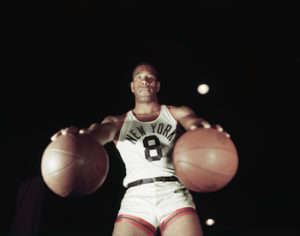
Nat Clifton
*Nat Clifton was born on this date in 1922. He was a Black basketball player.
Born in England, Arkansas, Clifton and his family moved to Chicago when he was eight. His birth name was Clifton Nathaniel, but after he became a high school star athlete, he reversed the two names when sportswriters complained that the last name Nathaniel was too long to fit in a headline. The nickname "Sweetwater" (or "Sweets") is often reported to have come from his fondness for soft drinks, especially Sugarwater.
Clifton dominated his opponents at 6-foot-7 and 235 pounds while playing basketball at Chicago's DuSable High School. His hands spanned ten inches, and he could easily pick up and palm a basketball. In the city championship semifinals in his senior year of 1942, he scored 45 points, blowing away the former tournament record of 24. He also played softball on a team called the Gas House Gang. After high school, Clifton played one season at Xavier University before being drafted into the U.S. Army in 1944. He served for three years in Europe and became professional on returning home, becoming the first black player to join the Dayton Metropolitan and then New York's Harlem Rens.
In July of 1948, Clifton signed with the Harlem Globetrotters. Clifton was signed for a reported annual salary of $10,000, the highest salary paid to a black basketball player up to that time. Also, Clifton played for three seasons in major league baseball's farm system, the AA-level team in Wilkes-Barre, Pennsylvania. In the summer of 1950, after the Boston Celtics had drafted Chuck Cooper and officially broken the NBA's color line. Abe Saperstein sold Clifton's contract to the New York Knickerbockers for $12,500, of which Clifton pocketed $2,500.
Clifton made his Knicks debut on November 3, 1950, and the Knicks made the NBA finals during each of Clifton's first three years. He averaged 8.6 points per game as a rookie and cracked double digits in his second year. Clifton felt restricted by the conservative style of Knicks coach Joe Lapchick, who favored a game very different from the fast, high-scoring contests Clifton had been used to with the Globetrotters. Nevertheless, his career with the Knicks was a solid one. He got along well with his white teammates. Clifton joined other Knicks players at card games and in church. Only once did an opposing player, Bob Harris of the Celtics, insult Clifton with a racial slur, and Clifton knocked him out cold. After a knee injury in the mid-1960s, he retired.
Clifton’s basketball resumes also included 1950-57; Detroit Pistons, professional basketball player, 1957-58; Harlem Magicians, Harlem Globetrotters, and Chicago Majors, basketball player, 1958-early 1960s.
Popular in Chicago after basketball, Clifton continued to live in his home neighborhood. He had to find a job because he was married and had no pension from the NBA. Though he had many contacts near home and probably could have landed a city government job, he settled on driving a taxi and continued to do so for the rest of his life. Inducted into the Black Athletes Hall of Fame in 1978, Clifton died at the wheel of his cab near Chicago's Union Station on August 31, 1990.
Reference: